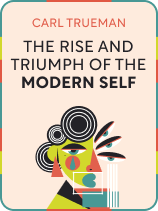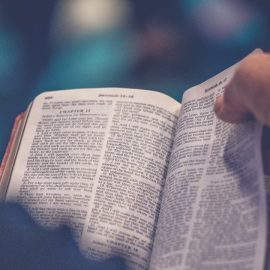

This article is an excerpt from the Shortform book guide to "The Rise and Triumph of the Modern Self" by Carl Trueman. Shortform has the world's best summaries and analyses of books you should be reading.
Like this article? Sign up for a free trial here.
When did the traditional view of human nature go out of fashion? How did this transformation occur?
Carl Trueman explains that traditional Christian teachings hold that human nature is fixed, universal, and not determined by the individual. That view has changed significantly over the last few decades. Trueman takes us on a historical journey from Jean-Jacques Rousseau to today’s Marxists.
Read more to understand these various views of human nature throughout Western history.
Views of Human Nature
The transformation into the modern self began with a turn toward focusing on internal experiences rather than external circumstances. While Rousseau laid the foundations for the rise of the “emotional and natural inner self,” he still believed in the traditional Christian idea that humans had a fixed and universal nature. The next part of the transformation undermined this view of human nature. Trueman identifies three figures who played a major role in this transition: Charles Darwin, Karl Marx, and Friedrich Nietzsche.
Rousseau’s Interior Morality
Trueman’s analysis begins with the 18th-century Swiss philosopher Jean-Jacques Rousseau, who elevated the moral status of the inner self. According to Christian traditions, humans are born sinful but become virtuous by following divine morals that are passed on through institutions. In other words, people must learn to be good.
Rousseau argued the opposite: People’s natural moral intuitions are good, but they behave badly because they suppress these intuitions to conform to a corrupt society. For example, he states that vices like envy, pride, and competitiveness are only active in social situations. You need to see what someone else has to envy them. Trueman explains that Rousseau’s moral philosophy lays the groundwork for a view that the inner self stands in tension with society, and that, of the two, the inner self is morally superior.
(Shortform note: Rousseau’s ideas on human nature were controversial in their time. The French philosopher Voltaire (born François-Marie Arouet), rejected the idea that moral intuitions could be superior to reason cultivated through education. He believed that humanity could improve its conditions in life by cultivating intellect and famously joked that Rousseau’s celebration of “natural man” made him want to “walk on all fours.” The political philosopher Edmund Burke also pushed back on Rousseau’s cynical attitude toward institutions and traditions. He argued that society and its traditions were the product of accumulated wisdom and a necessary source of morality and social order.)
Charles Darwin’s Theory of Evolution
Trueman argues that the 19th-century biologist Charles Darwin undermined the Christian view of human nature through his theory of evolution. This theory states that living organisms are shaped by the natural forces of mutation and natural selection and that, through these processes, humans evolved from early primates like apes and monkeys. This challenges the traditional Christian conception of universal human nature in two distinct ways.
- According to Christian tradition, humans are exceptional in nature and created in the image of God. Accepting Darwin’s theory requires a complete revision of humanity’s place in the world. If humans came to exist through impersonal forces that created other plants and animals, then they’re no longer exceptional or created in God’s image.
- According to Christian tradition, humans were created for a unique purpose: to find communion with God by upholding a sacred moral contract. The creation of humans through random or natural forces detaches their nature from this sacred moral purpose.
| The Christian Reaction to Darwin Many atheists and Christians alike agree that Darwin’s theory of evolution undermines the Christian doctrines that humans are exceptional and created to fulfill a sacred destiny. However, during the 19th century, Christians were split in their response to his theories and in their attempts to reconcile them with Christian theology. The theory was rejected outright by Young Earth Creationists who maintained a literal interpretation of Genesis in which the earth is only around 6,000 years old. In particular, Darwin’s theories were denounced by the Anglican Church. However, during the 19th century, many Christians had already adopted the old Earth hypothesis, which maintained that Earth was created several billion years ago, and believed this view compatible with the Christian faith. The theologian B. B. Warfield argued that, if proven, evolution would pose no threat to scriptural authority. The botanist Asa Gray, a staunch early defender of evolution, was also a devout Christian who maintained that God acted through the laws of nature. |
Karl Marx’s Political Selfhood
Trueman asserts that Karl Marx undermined the Christian idea of a universal human nature by placing greater importance on political and economic relationships. A 19th-century German philosopher, Marx proposed radical economic theories that are known today as the foundations of communism.
Marx believed that the upper and lower economic classes exist in a constant power struggle with each other, one in which the lower classes have the moral high ground because they’re economically oppressed. According to this view, the morality or immorality of any human action is determined by which class’s interests are served. This means that the most important thing to understand about a person was neither their inner life nor their moral life, but where they stood in a socioeconomic hierarchy.
This view runs contrary to the traditional Christian idea that humans have a universal nature that exists prior to their political and economic relationships with one another. It also downgrades the importance of divine law in evaluating morality.
| What Do Contemporary Marxists Say About Human Nature? Many modern Marxists agree with Trueman’s characterization that Marx overturned the view of a universal human nature. However, not all Marxists share this interpretation. Some argue that a consistent view of human nature can be found in Marx’s idea of “alienation.” Marx’s theory of alienation maintains that workers are “alienated” from their work in factories through the repetitive nature of their jobs and their lack of ownership over the profits. Some modern Marxists extrapolate from this that Marx believed people had an innate drive toward creative, varied, and independent forms of labor—something like human nature. Trueman’s analysis is largely focused on the greater cultural impact of Marx’s ideas rather than his particular views of human nature. However, it’s worth noting that the Marxist view of human nature also aligns with Rousseau’s: The self is in tension with society because its natural passions and inclinations are thwarted by socioeconomic arrangements. |
Friedrich Nietzsche’s Individualism
Trueman explains that the 19th-century German philosopher Friedrich Nietzsche also subverted the Christian understanding of a universal human nature with a divine purpose. According to Trueman’s analysis, Nietzsche elevated the authority of the individual by rejecting all external sources of authority for morality or truth.
Nietzsche proclaimed that individuals had the freedom and the responsibility to create truth and morality for themselves. According to this view, there is no such thing as objective truth or morality: Individuals must determine for themselves what is good and bad. This view holds human nature as something that each individual invents, rather than an objective source of truth that holds authority over humanity. This erodes the Christian view of human nature that people were created by God to follow divine moral laws, not to invent their own laws.
| How Did Nietzsche Become Influential? While Nietzsche wrote and lived during the 19th century, his work was obscure during his lifetime and became popular because of its influence on other thinkers during the 20th century. His ideas influenced two important movements of 20th-century European thought. Existentialist philosophers like Martin Heidegger and Albert Camus were drawn to Nietzsche’s emphasis on individual freedom, while deconstructionists like Michel Foucault and Jacques Derrida were drawn to his suspicion of knowledge and authority. Nietzsche’s writings also found popularity in the Nazi Party, which saw a potent justification for authoritarian power in Nietzsche’s rejection of traditional morality and emphasis on individual will. Adolf Hitler himself actively promoted Nietzsche’s work, giving out copies of his books to soldiers and party members. Finally, Nietzsche also influenced the psychologist Sigmund Freud, who saw many insights into human character in Nietzsche’s self-assertive philosophy. |

———End of Preview———
Like what you just read? Read the rest of the world's best book summary and analysis of Carl Trueman's "The Rise and Triumph of the Modern Self" at Shortform.
Here's what you'll find in our full The Rise and Triumph of the Modern Self summary:
- How the modern conception of selfhood has changed over the centuries
- How Christian views have become stigmatized, damaging Western culture
- What modern Christians can do to preserve traditional values






